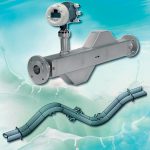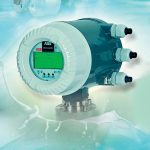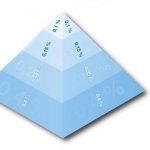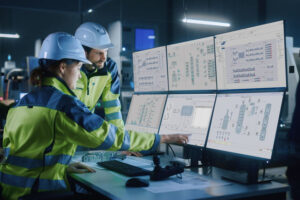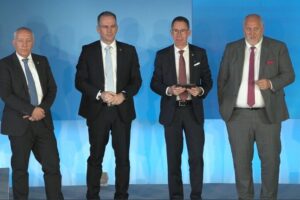CoriolisMaster flowmeters feature an outstanding accuracy, not only for the measured variable (mass flow or volume flow) but also regarding density and temperature measurement. The essential factor for achieving this accuracy is the appropriate meter tube geometry. The special double S design provides the best possible vibration properties and, thus, allows for especially thick tube walls, which are hardly affected even by external vibrations or a homogeneously distributed air or gas content.
Frank Frenzel
Temperature variations must be measured and compensated in order to ensure accurate density measurement. For the fluid temperature this is quite usual. What is new with ABB’s CoriolisMaster is that the meter’s housing temperature is also measured and considered accordingly. This allows for compensation of even considerable temperature variations, e.g. resulting from exposure to direct sunlight during the day and considerable cold at night. With this an accuracy of 0.001 kg/l is achieved.
An example is the density measurement of ethanol water mixtures in distilleries or chemical plants. The measuring instruments are installed outdoors and are, hence, exposed to direct sunlight causing an ambient temperature of up to +50 °C, whereas, at night, the temperature may fall down to -20 or even -40 °C, depending on the climatic zone. CoriolisMaster with its high-precision density measurement option continuously measures the housing temperature at different points and compensates these influences using special converter algorithms.
Practical, even with air and gas content
Besides the already described advantages regarding the meter accuracy, another important point which is essential for the user is the question how the meter will cope with suboptimal conditions like air bubbles or gas content. The basic Coriolis operating principle implies that the meter tube vibrations are transmitted to the measured fluid. This is considerably more difficult if the fluid contains air or gas. These gas portions do not necessarily follow the tube vibrations. In fact, they may attenuate the vibrations and can, hence, cause considerable measuring errors or even impede proper meter operation. Two measures can be taken to avoid this effect. On the one hand, you can use an ingenious converter technology, and on the other hand you can optimise the tube design. CoriolisMaster benefits from both solutions. Its advanced DSP technology provides for a high-speed control loop that controls the vibration energising current and, thus, the energy input. This avoids potential attenuation right from the beginning. Secondly, an elaborate filter provides for optimal signal processing and online plausibility checking.
The most important factor in addition to these electronic measures, however, is the design of the meter tubes. The special S design provides for optimal transmission of the vibrations to the fluid and for a strong differential signal. Moreover, the tube design ensures that local effects resulting from gas bubbles only have little impact on the tube vibration and, thus, only slightly affect the measuring accuracy. Test measurements have shown that even for a viscous fluid with an air content of 50 % (like gummi bear jelly) and largely homogeneously distributed gas bubbles a very high filling accuracy of approximately half a percent could be achieved. With a reduced air content the result is even better. In contrast, the reproducibility amounts to around 0.1 %. As a result, the sensitivity to disturbances is negligible.
Goodbye use restrictions
Things have changed: contrary to the for-mer trend to design a specific tube geometry for each measuring task, state-of-the-art solutions are often just the opposite way around. The disadvantages were just too obvious. In the past, meters with a high reproducibility but limited accuracy were required for process monitoring, whereas accounting or filling measurements called for devices with optimal accuracy. Both tasks were accomplished using devices of different designs and installation lengths which could not be exchanged with each other. As a result, the companies either had to use, keep on stock and provide training for twice the number of meters they actually needed, or they had to decide for the more accurate but also more expensive design, even though they did not need these sophisticated device features in many cases. ABB’s universal approach is different. A device with the potential for high-accuracy applications is available in different accuracy classes, ranging from 0.4 to 0.1 %. The only difference between the individual classes results from different calibration requirements. Devices with minor accuracy can be calibrated using reference mass flowmeters, whereas meters with an accuracy of 0.1 % require expensive high-precision scales and considerable calibration efforts. These additional costs can be saved if less accurate meters are sufficient, and the customer will benefit from this price advantage. The flowmeter converter is another example of the high flexibility offered. In the past, any converter replacement, e.g. when changing over from Hart to Profibus, either necessitated a recalibration or the customer parameters had to be set again. Today, a plug-on Fram chip provides for data storage, reducing the time requirements for replacing the electronics to only a few seconds.
The special strength of Coriolis mass flowmeters is their variety of measuring values. Besides the mass and volume flow, they can measure the density with 0.001 kg/l and with a reproducibility of 0.0001 kg/l. In a practical example this means you can exactly measure a knife point of sugar (1 g) in approximately one liter of coffee. Even a tenth of this quantity would be detected by the meter. A typical application which benefits from the advantages of this multi-variable flowmeter is the phosphoric acid filling process for Coca Cola. Acid water mixtures of different concentration are delivered for different truck loads. In the past, phosphoric acid in a 98 % concentration was filled in the truck tank and then the corresponding water quantity was added. Nowadays, the water is added in online mode, i.e. a CoriolisMaster controls the exact concentration to 1 g/l (reproducibility 0.1 g/l) through density measurement. The truck is no longer filled up to its total capacity (approximately 30 t) minus 10 kg, but to its full capacity, without the risk to overload the truck in breach of the road traffic regulations or the need to spend much effort on reloading the truck.
In other applications, e.g. the density measurement of a methanol water mixture, the devices are used as pure density meters to replace other methods like radiometric or optical density measurement. As the disposal of radioactive water or the cleaning of lenses is no longer required, the measurement is possible at reduced costs and with less bureaucracy and maintenance requirements.
Conclusion
ABB’s Coriolis flowmeter technology offers a combination of high accuracy, practice orientation and application flexibility. Due to its numerous measuring values, a single meter replaces several measuring points with density meters and temperature sensors and can fully benefit from its versatility in both demanding and standard applications. What is more important: due to their state-of-the-art technology ABB´s Coriolis flowmeters are so easy to install and operate – just like a walk in the park.
cpp 407
More about the CoriolisMaster
SPS/IPC/Drives
Share:



